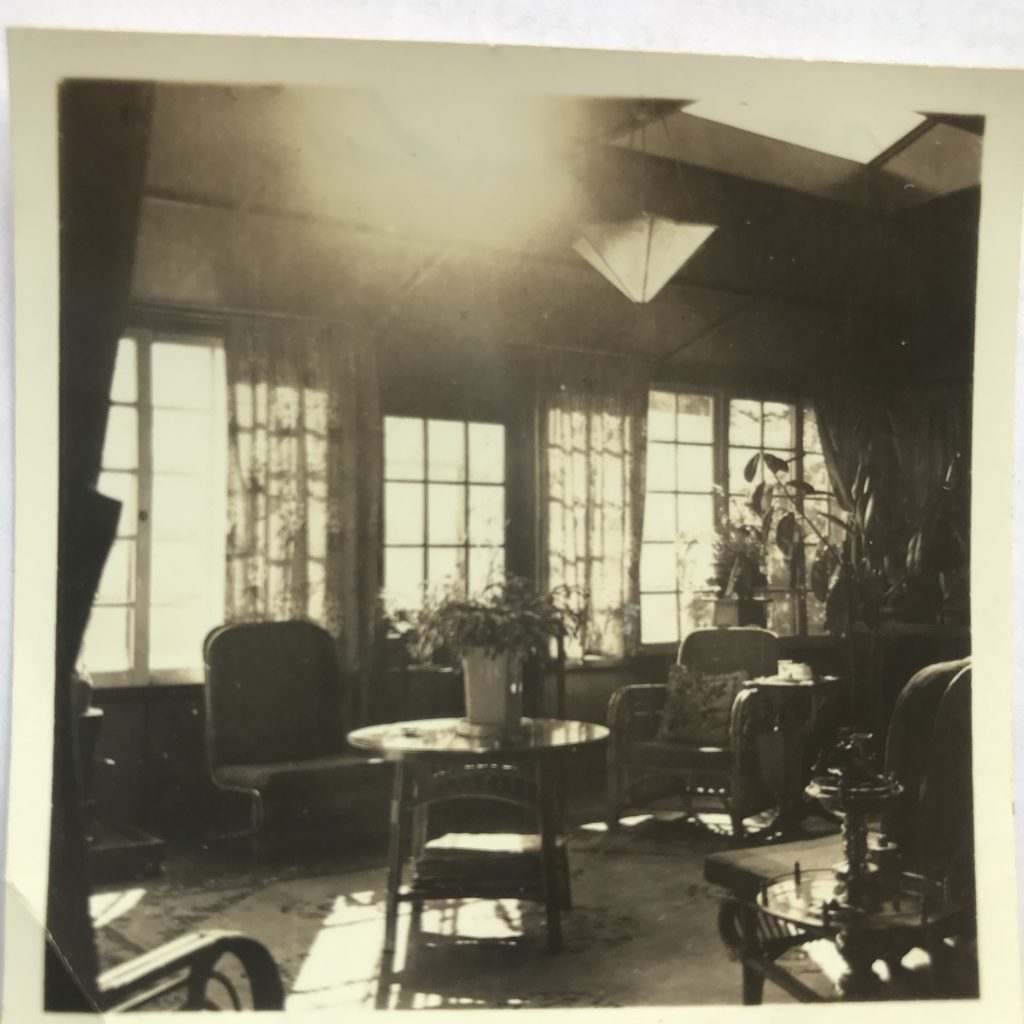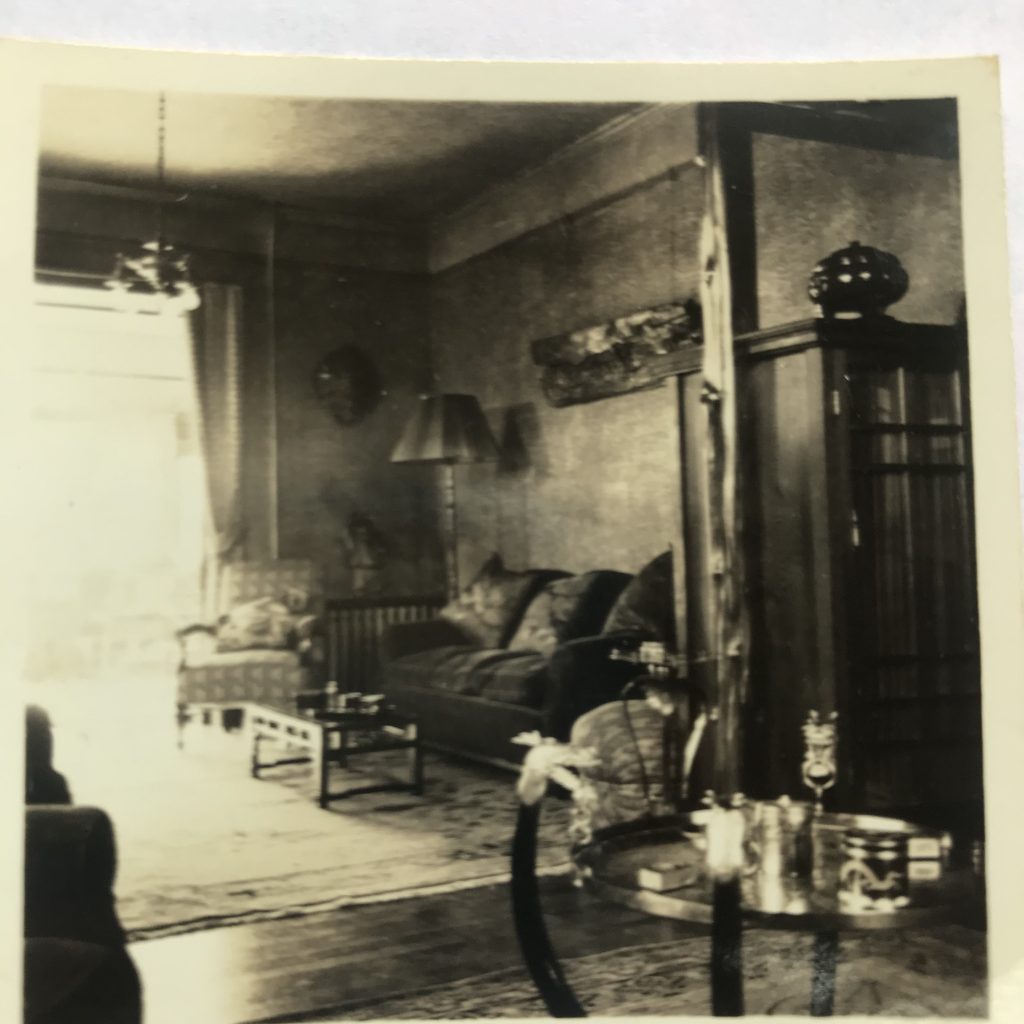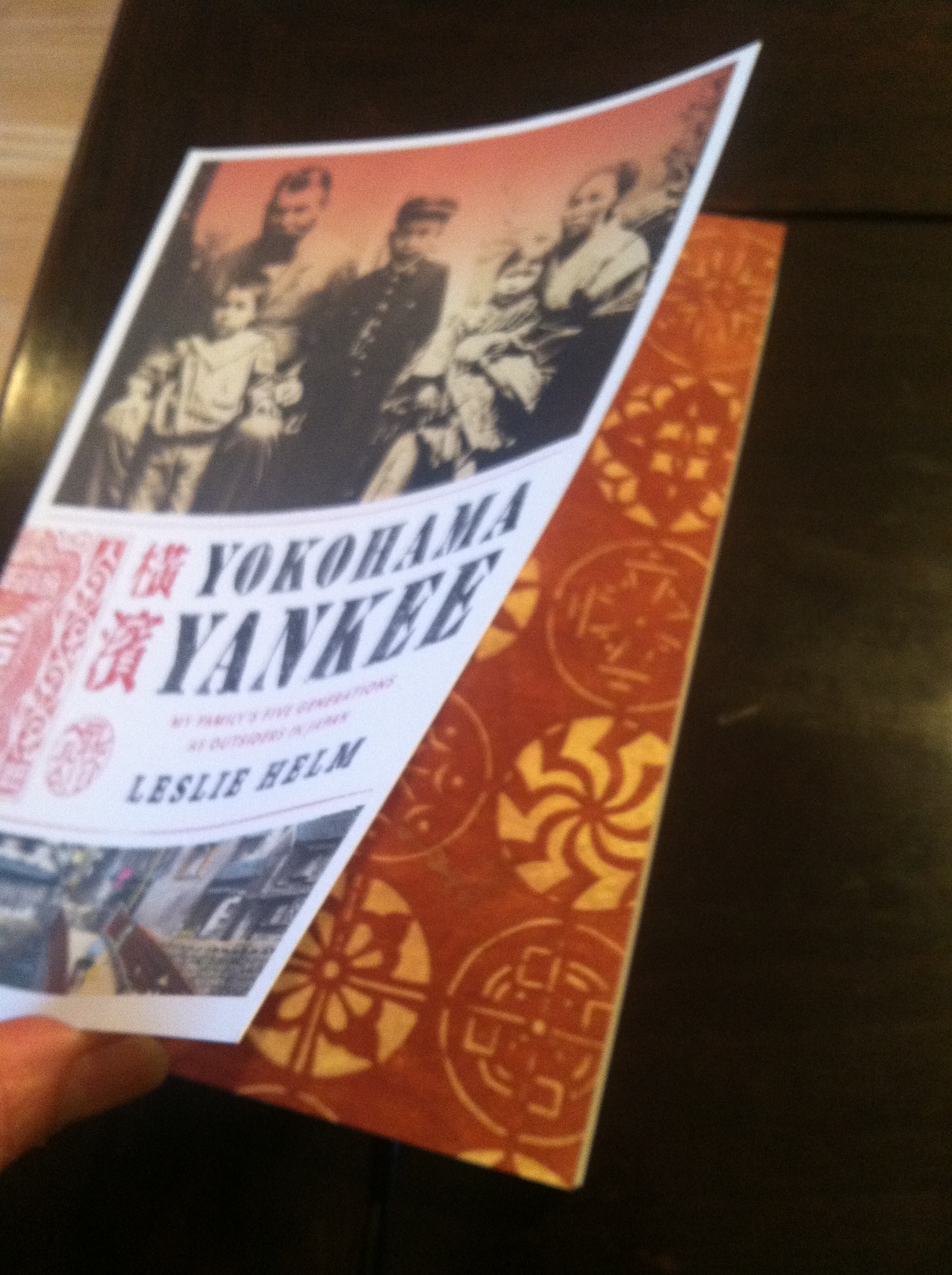Louise Saal, 85, remembers the morning in Yokohama that the bombers came and her parents rushed her and her two brothers into the underground bomb shelter behind the house. When the bombs fell, their house exploded into flames along with the trees around the property. Her parents knew the bomb shelter was no longer safe.
They took old clothes stored in the bomb shelter with the intention of donating them to an orphanage. They soaked the clothes in water then ran outside to a clearing at the top of the hill created by bombs dropped some days earlier. Then her parents lay her and her two brothers in the shell of a downed water tank where they lay as they watched the bombers continue to fly by dropping the bombs that floated down before releasing dozens of milk-jug sized fire bombs onto the city.
Saal, who is doing research for her memoir, looked up Yokohama on the web to learn more about the city that had been her home for six years. She read Yokohama Yankee and contacted me. I called Louise at her New Hampshire retirement home. Shut in by a heavy snow, she spent several hours talking about the strange circumstances that led her to Yokohama.

In an amazing coincidence, it turns out that Louis lived for much of her time in Yokohama at 78 Nishinoya-cho in the house that my grandfather Julius Helm had built and that my father and his two brothers grew up in.
My father and his family vacated the Nishinomiya-cho house when they left Japan in August 1941 after numerous warnings from the American embassy that the family should leave to avoid a coming war. Right about the same time, Louise’s family was moving in the opposite direction.

Louise’s father, Alois Stockinger, left his home in Bavaria in 1923 at age 19 to immigrate to Chicago. At the time, German was in a recession, and the only jobs available to him were in the coal mine in Penzberg, the town where he lived. Alois was particularly sad to leave behind a twin sister, Therese, with whom he was very close.
In Chicago, Alois worked hard and built a good life as a machinist for Nabisco. He married Maria Brokamp, also from Germany, and had two children. Rudi was born in 1935 and Louise, the following year, in 1936. While he was happy with his life in Chicago, Alois desperately missed his twin sister Therese. He had repeatedly written to her asking her to join him in Chicago, but his mother, whose two sons had already immigrated to America, refused to allow her to leave. Consequently, in 1941, even as war was raging in Europe, Alois decided to return to Germany to visit his twin.
Crossing the Atlantic to Europe was too dangerous at the time, so in the summer of 1941, Alois decided to take the long route home to German. He set out by train to San Francisco, then across the Pacific to Yokohama, Japan with the intention of taking the Tran-Siberian Railroad across Russia to reach Germany. Alois took with him his wife Maria, his five-year-old son Rudi and his daughter Louise, who was then four.
When they arrived in Yokohama, they decided to do a little touring before taking the train and ferry to Russia to take the train. They traveled to Karuizawa then Kamakura where the family stayed at the Kaihin-in, an elegant old hotel on the beach. “My father was a great swimmer and he would take these long swims far out into the ocean,” recalls Louise. “He would be gone so long I was afraid he would never come back.”
A few days after their arrival in Kamakura, Louise recalls her parents becoming quite upset. Only later did she learn that Japan had just bombed Pearl Harbor and was now at war with the United States.
Her parents were advised that it would now be too dangerous to travel to Russia to catch the Trans-Siberian Railroad. Meanwhile, returning to the United States was now impossible. The family decided to move to Yokohama where there was a large German community. The German consul in Yokohama introduced Alois to the Helms, and the family then moved into my grandfather’s home at 78 Nishinoya- cho. “It was a nice house with a large, nicely landscaped garden, a large pond with big coy fish and a swing. There was a big iron fence that was more than eight-feet-tall that was later taken down to use for the metal for war production, though the metal was never collected.” Next door, she says, was another Helm home. It was occupied by a tall man who was a Helm but was Japanese. Up the hill, on the right side, at 66 Nishinoyacho lived the Horios. Louse remembers Mrs. Horio as being named Martha. She had German and Japanese blood and spoke both languages. She later used the name Masako, perhaps because foreigners were less welcome as the war dragged on. “My best friend was Trudy Paul,” Louise recalls.
As it became clear the family would be in Yokohama for a while, the children were sent to local schools. “We went to the German school in Yokohama. I loved the singing and the arts and crafts. It just opened the world to me to be with other children,” Louisa recalls. “Once I went with my mother to visit someone at Helm House. It seemed very modern.”
When the Doolittle raid came in April 1942, an American effort to shake up the Japanese, the planes flew low and machine gunned the area. “In the house behind us, a bullet went through the roof and stuck in the wall,” says Louise. “They were shooting the Japanese to try to scare them.”
In February 1943, Louisa’s brother Siegfried was born at the Bluff Hospital, which was then operated by nuns. He was a handful. Once, when he as two and a half, he climbed onto a toy truck and escaped his playpen and walked all the way to the Horio’s to visit Mrs. Horio and her son.
In September 1943 there was a big explosion in the harbor. Nobody was sure, but there were many German ships in the harbor at the time and some people thought it might be sabotage. Louisa recalls being in the dining room at the time. Her Dad thought Rudi had slammed the door, and told Rudi to go out again and come back, this time closing the door quietly.
After the bombing, without their ship, a large contingent of German soldiers were stuck in Yokohama. “We took in three German soldiers,” recalls Louise. “Thanks to them we had a very special Christmas. At the time there were no Christmas trees available. The soldiers took pine branches, made holes in the trunk of tree and created a nice tree. One of the soldiers carried my brother around.
In March 1945 the American bombers appeared. “We would watch them. When a plane was hit, they would head in our direction as they tried to reach the ocean. They would often drop their remaining ammunition on the hill above us before heading to the ocean so we would see them. Once, five houses on top of our hill were hit. We watched the bombs hit and explode. Everything on top of the hill was reduced to rubble.
One morning, the warnings came again, and, as usual, the parents rushed the family into the small bomb shelter behind the house. “When the trees above us started burning, we knew it wasn’t safe to stay in the shelter,” says Louise. “There were some old clothes that my mother had stored in the shelter planning to give them away. My parents wet the clothes and wrapped them around us and we rushed [through the fire] to the clearing [by the earlier bombing at the top of the hill.] There was a big metal tank that was empty. We lay down in the tank and the airplanes dropping their bombs.
“The next morning we went to our house. One bomb had landed in the kitchen and the motor from the refrigerator was at the other end of the house. Everything had burned except one chicken. Our father caught the chicken and put it in the garage, which had survived the fire.
“Two days later, the trucks came to evacuate us. My older brother went to that garage and got the chicken. He carried it in a helmet he had found as we got on the truck. As we drove away we saw burned bodies lined up along the street. At one house, the family had stayed in the air raid shelter and they had all died. We were thankful that we had parents who knew how to do the right thing. We were thankful that we survived.”
“The trucks took us to Hakone. At first we stayed at a house near a golf course. They brought injured military horses to the golf course to recuperate. My brother went there a lot, and the workers gave him a horse to take care of. Later we stayed in a village that [they said] had been built for the Olympics (originally planned for October 1940 but then cancelled.) The Rilings who had lived in Indonesia, the husband was a German businessman, lived there. The husband was later sent back to Germany to fight in the war.”
In April 1945 when Roosevelt died “we thought it would be the end of the war,” recalls Louise. “What did we know.”
In Hakone, there was a one-room German school in a hotel for 12 kids. Sometimes, we got salmon, canned tuna and lard that was distributed to the German community. “Towards the end of the war we ran out of food and my father and brother set traps to catch rabbits,” says Louise.
“When the war ended a U.S. Army captain and a soldier came in on a Jeep. My brother spoke English and Japanese so he went with the soldiers to help them with translation. They saw we didn’t have food, so they brought us flour and Crisco. Mother made crullers–like donuts. They all loved her food so they often visited. The pilots admitted they had bombed Yokohama. But they didn’t hate us and we didn’t hate them. One pilot wanted to adopt my 3-year-old brother, Siegfried. He said, ‘my wife and I can give him a great life.’ Mother said ‘no I won’t give him up.’ The American soldiers came on day trips for recreation. White and black soldiers always travelled separately.
In 1947, when Louise was eleven, the family was sent back to Germany on a U.S. troop transport ship along with many others in the German community. “We went through the Suez Canal, around Gibraltar, and then when we got to the North Sea, we had to follow an ice breaker [to the German port.] We spent 35 days on that troop transporter in very bad weather. Once they held a concert on deck, and everybody fell over with their instruments and all.”
“The family was placed in a large camp at Ludwigshaven. Everybody was required to stay in the camp. My brother bribed someone to send a telegram to my uncle. My uncle was in the Bavarian police force, and arrived with my grandfather in a police car. As we were preparing to leave, my uncle put his foot on the running board of the car while he rolled a cigarette. My mother said to me ‘go get a pack of cigarettes.’ Mother had bought several cartons of camel cigarettes on the ship. When my uncle saw that pack of cigarettes, he really lit up. He would say, ‘Maria, do you have another pack.’ She would say no, but then whenever uncle would do us a favor, she would give him more cigarettes.
“There was a housing shortage in Germany at the time, so we lived with my grandfather for five years until 1952. The apartment was on [one floor of]a three-story building built for employees of the local coal mine. The apartment had two bedrooms and a kitchen and that is where our family stayed. It was pretty tight.
“We spoke high German, but in Bavaria they spoke differently so sometimes they would make fun of us and throw rocks at us. One boy called me “American whore.” My big brother beat him up and then there was peace. In school, I found most students and teachers supportive. We didn’t have much, but we didn’t have television, so we didn’t know what the rich people had, and we were happy. We had parents who loved us, and that was the most important thing. I had a wonderful teenage time.
“In 1952, when my parents said we would return to the United States, I didn’t want to go. I was in a commercial school and I was happy. But we moved back to the United States and went to live in Union City, in New Jersey. We were near New York City, and I spent a lot of time there. We skated in Central Park and went to Radio City. After my sophomore year in high school, I felt very accepted. I spent more time looking up words in my dictionary than doing my homework. After high school, I took a job at Chase Manhattan bank in Wall Street. At night I studied accounting at NYU. When I got married I quit, but I finished my degree [when the kids were in high school] and graduated [college] at the same time as my younger son.
“In the United States, I was always more comfortable with people of German descent. In [Manhattan] around 86th street was Yorkville. It was a very German section where there were establishments that had German music. My boyfriend and I went dancing there. Union city also had some German Clubs. We had a sense we were different from others. We [German-Americans] had different rules. The culture was a little different. I married another German in 1957. We took a trip to Germany and I got the approval from his mother. When I was raising my children we felt different. We [German-Americans] were stricter. We had two sons and a daughter. We moved to Cramford, New Jersey where I raised my children. After that, we didn’t see many other Germans and we stopped speaking German.”
“The children always asked me to talk about the war days. But my biggest tragedy was what happened to my daughter. While she was away in college, a friend called asking to buy the extra car my daughter had used [before she left for college.] I thought my daughter didn’t need it so I sold it. When my daughter came home from college [one weekend,] she was invited to a party. She didn’t have a car so a friend took her to the party. Afterward, a young man offered her a ride home. After the party, the two parked in front of the house and talked. When we woke up in the morning, the two were dead from carbon monoxide poisoning. The boy had a new muffler in the trunk. He knew about the leak in the muffler and was planning to fix it. If I hadn’t sold the extra car, my daughter wouldn’t have died.”
“When my husband died two years ago, I sold the house and moved to this retirement home [in New Hampshire.] My son is in Birmingham, north of London. He is an economics professor. I was on the computer and reading about Yokohama and came across your book [Yokohama Yankee.] I mentioned it to David, and he bought it on Amazon and sent it to me. It reminded me of my good times in Japan.
“Your stories about the Helm stevedoring business reminded me of my husband. He worked as an electrician for an overhead handling company that built cranes for moving heavy things in warehouses. Later he designed and built lifting systems for moving moving boats and large crates in factories and warehouses. He met Malcom McLean, an American truck driver who would drive cargo to the waterfront where it would take two days to move the cargo from the truck to the ship. Then unions would strike and the work would be put on hold.” McLean came up with the idea of packing cargo in uniform containers so that cargo could be quickly loaded and unloaded from ships. Later he started SeaLand, which would develop into a the giant stevedoring and shipping company.
“I’ve had a very good life,” says Louise.
